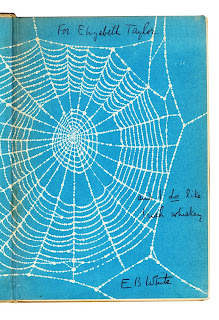Elizabeth Taylor’s avowed aversion for adventure, coupled with a horror of publicity, goes some way to explaining why her talent as a writer remains underrated. Writing just after the second-world war, Taylor impressed many of her contemporaries, including Kingsley Amis, but fell into relative obscurity towards the end of her career.
 |
| "Taylor's marvellous, dark novel" |
An excerpt from the jacket of her novel A Wreath of Roses shows an author who confined
herself to the domestic dramas of middle England, much in the tradition of Jane
Austen. “I hate ‘adventure,’ ‘experience,’ [I] can never make any use of them or assimilate them," she said. "Change disrupts me and I cannot write. [People] are my only adventure and I hope never to have any others.”
Despite these rather prissy sentiments, she was in the words of her contemporary, Rosamond Lehmann, “sophisticated, sensitive and brilliantly amusing, with a kind of stripped, piercing feminine wit.” Her nuanced prose could ridicule a character’s folly and then subvert the reader’s response with a poignant twist of sympathy.
Taylor’s early success, beginning with the publication of At Mrs Lippincote’s in 1945, coincided with the rise of her more famous namesake, making it difficult for her to attract due recognition. (The writer once received fan letter requesting a photograph of her in a bikini – with customary wit she remarked this was not possible since she did not own one.) The centenary of Taylor’s birth last year has helped to rehabilitate her work, including her twelve novels – one shortlisted for the 1971 Booker prize – and dozens of short stories, many of which appeared in The New Yorker magazine.
 |
| John owned a confectionary company |
Despite a quiet life in Buckinghamshire
with her husband John and two children, Taylor was dedicated to her art and developed
intense friendships with other writers. Notwithstanding an early and passionate affair, her
relationship with her husband was based on mutual respect and she inscribes a
dedication copy of her novel Palladian
to him.
Amongst the collection is a first edition
of E. B. White’s children’s book, Charlotte’s Web, which Taylor read aloud to her grandchildren. An inscription from
White, who stored his manuscripts in old whiskey cartons, bears a private joke: "and I do like whiskey."
 |
| A private joke? |
In another inscribed book – The Second Tree from the Corner – White
describes himself as Taylor’s “grateful reader,” a sign of their esteem for one
another. Taylor’s son says his mother rarely travelled to the United States, but
fostered her friendship with White through a long and frequent correspondence.
Like Taylor, White valued his privacy, often slipping out of his office via the
fire-escape to avoid meeting visitors.
In the same collection, an inscribed copy
of Bowen’s Court, an account by
Elizabeth Bowen of her beloved home in County Cork, Ireland, speaks of a more
intimate friendship. Inserted at the back of the book are clippings of Bowen’s 1973
obituaries snipped out, presumably, by Taylor herself who once wrote how she “worshipped”
her friend. Taylor stayed with Bowen in Ireland, both of them working
companionably on their respective projects. Bowen’s book remains, among other
things, a memorial to “the authority of light and quiet” around the house,
which served as a retreat to many of her artistic cronies.
Elizabeth Taylor’s collection of books stands
as a similar monument to a writer’s life. Their personal inscriptions hint of
experiences enhanced by her adventures with people – friends as well as characters
in her novels.